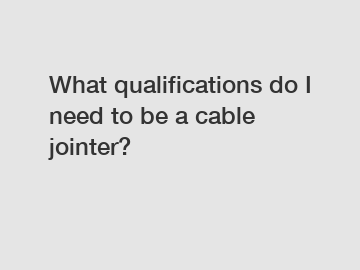What qualifications do I need to be a cable jointer?
In our increasingly interconnected world, the demand for skilled professionals who can ensure seamless transmission of electricity through underground cables has soared. Cable jointers play a crucial role in handling and maintaining complex electrical systems. But what qualifications are necessary to embark on this rewarding career? In this blog, we'll explore the essential skills, knowledge, and certifications needed to become a proficient cable jointer.
1. Educational Foundation:
To start your journey as a cable jointer, a solid educational foundation is crucial. While a specific degree may not be mandatory, a background in electrical engineering or a related field is highly beneficial. Understanding electrical principles, circuitry, and systems will provide you with a strong foundation to build upon as you progress in your career.

2. Technical Expertise:
Cable jointing is a technically challenging profession, requiring a deep understanding of various types of cables, their structures, and the intricacies of jointing methods. Practical knowledge of cable jointing techniques, such as heat shrink, cold shrink, and resin-based jointing, is essential. Familiarity with different cable terminations, underground cable installations, and fault finding techniques will set you apart as a competent professional.
3. Certifications:
Acquiring industry-recognized certifications is vital for aspiring cable jointers. Certifications validate your skills and knowledge and demonstrate your commitment to adhering to industry standards. Some key certifications to consider include:
a) City and Guilds 6282/03 Cable Jointer Level 3: This certification covers a wide range of skills essential for cable jointing, including cable preparation, jointing techniques, terminations, and testing.
b) Jointing Competency Certification: Offered by cable manufacturers, this certification validates your competency and expertise in handling specific jointing systems and product ranges.
c) Safety Certifications: Completing certification programs like Electrical Safety Rules and Working at Heights will demonstrate your commitment to maintaining a safe working environment.
4. Practical Experience:
While qualifications are essential, hands-on experience in the field is equally valuable. Seek opportunities to work alongside experienced cable jointers or apprenticeships to gain practical exposure. This practical experience will enhance your abilities to handle real-life scenarios, expose you to a variety of cable types and systems, and improve your fault-finding skills.
5. Awareness of Industry Regulations:
Cable jointers must stay up-to-date with industry regulations and codes of practice to ensure compliance and deliver high-quality work. Familiarize yourself with standards such as National Grid Engineering Drawing NGS-0532, Health and Safety Executive (HSE) regulations, and ISO 9001 quality management systems. Awareness of these regulations will demonstrate your professionalism, reliability, and commitment to safety.
6. Communication and Teamwork Skills:
Effective communication is crucial for cable jointers, as they often collaborate and coordinate with engineers, project managers, and other stakeholders. Strong communication skills will enable you to discuss work requirements, coordinate installations, and report any issues. Additionally, good teamwork skills will help you navigate complex projects, maintain a positive work environment, and contribute to successful outcomes.
7. Continuous Learning:
The world of cable jointing is constantly evolving, with new technologies and techniques emerging regularly. It is vital to maintain a passion for learning and stay updated on industry advancements. Attend workshops, seminars, and training programs to enhance your knowledge and skills. Pursuing further qualifications and certifications will not only broaden your expertise but also demonstrate your commitment to professional growth.
Conclusion:
Becoming a cable jointer requires a combination of technical knowledge, practical experience, and continuous learning. While a degree in electrical engineering may provide a solid foundation, industry certifications and practical exposure are equally valuable. With the right qualifications, a cable jointer can enjoy a rewarding career, ensuring the consistent transmission of electricity and powering our modern world. So, if you aspire to be a cable jointer, remember to equip yourself with the necessary qualifications and embark on this exciting journey!
If you are looking for more details, kindly visit china adss tension clamp, adss cable clamp, opgw fiber meaning.


